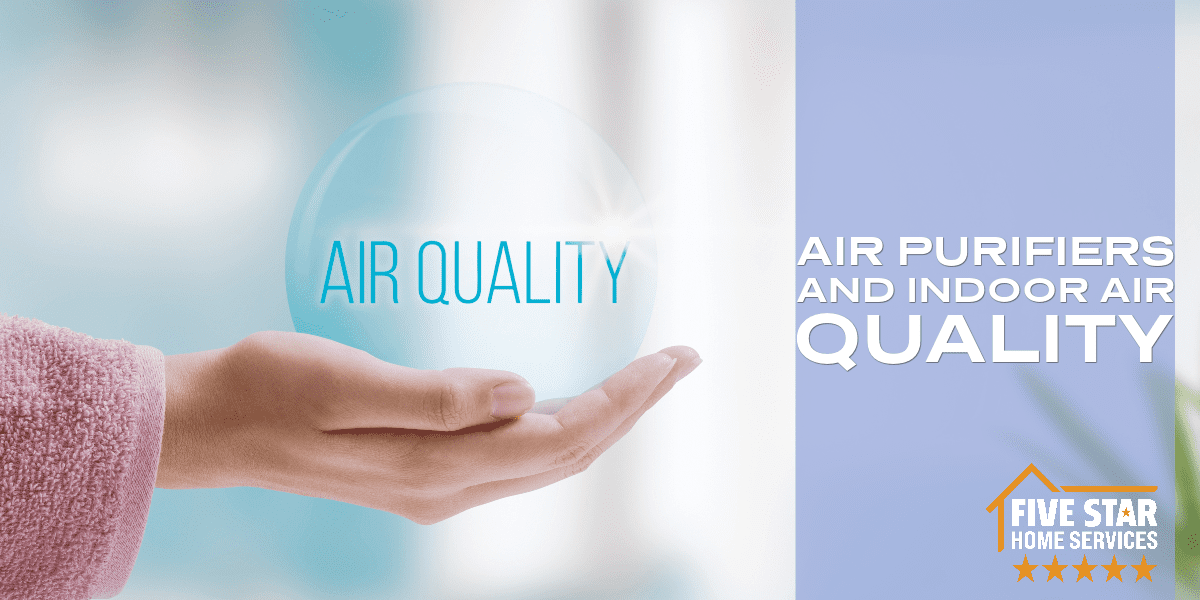Whenever HVAC professionals talk about indoor air quality, they are talking about the levels of health, safety, and comfort of the air inside a home or building. Because air quality is a growing concern for many, one of the best ways you can improve the quality of air in your home is by using an air purifier.
Although many people have a water purifier in their homes, not many do the same for their air. In the following, we will tell you everything you need to know about air purifiers and how they can help indoor air quality.
For starters, we should clarify, that when we talk about indoor air quality, we’re talking about two levels of health, safety, and comfort of the air in your house.

One of the ways you can improve the quality is by using an air purifier. We will explore the following questions as we continue:
- What is an air purifier?
- What are the pros and cons of air purifiers?
- How much does an air purifier cost?
- And finally, is an air purifier, right for you?
What Is an Air Purifier and How Does It Work?
An air purifier is a device designed to cleanse the air in a room by removing impurities such as dust particles, allergens, and toxins. It works by drawing in polluted air and passing it through a series of filters that trap harmful particles. The clean air is then circulated back into the room. Some purifiers also include technology to neutralize odors and trap bacteria or viruses. By cleaning the air, these devices can contribute to a healthier and more comfortable living environment.
Air purifiers are becoming increasingly popular as people become more aware of the importance of air quality. In fact, according to a survey conducted by Consumer Reports, over 70% of households in the United States own at least one air purifier. This is not surprising considering that indoor air can be up to 5 times more polluted than outdoor air.
One of the main benefits of using an air purifier is the improvement of respiratory health. By removing harmful particles, these devices can help reduce symptoms of allergies, asthma, and other respiratory conditions. This is especially beneficial for children, elderly individuals, and those with weakened immune systems.
In addition to improving respiratory health, air purifiers can also have a positive impact on overall well-being. Poor air quality has been linked to headaches, fatigue, and even depression. By removing pollutants from the air, an air purifier can help reduce such symptoms and improve overall mood.
What Are the Pros and Cons of Air Purifiers?
Air purifiers can be a beneficial addition to any home or office, particularly in areas with high levels of pollution or for individuals with allergies. They help in removing particulate matter, such as dust, pollen, and pet dander, enhancing the quality of indoor air. This can be particularly beneficial for people with respiratory conditions or allergies. Some air purifiers also neutralize odors, providing a fresher indoor environment.
However, they also have their drawbacks. First, air purifiers can be expensive to purchase and maintain, as filters need to be replaced regularly. Also, while they can filter out many pollutants, they are not effective against gases such as carbon monoxide or radon. Moreover, some air purifiers produce ozone, a lung irritant, as a byproduct. Lastly, they cannot completely eliminate all allergens and microorganisms, particularly those embedded in furniture or carpets.
This is where regular cleaning and maintenance come into play. It is essential to vacuum regularly, dust surfaces, and change the air purifier’s filters as recommended by the manufacturer. This will help in minimizing the build-up of pollutants and maintaining the purifier’s effectiveness. Additionally, using an air purifier should not be seen as a replacement for good ventilation practices.
Proper ventilation is crucial in maintaining a healthy indoor environment. It allows for the exchange of stale air with fresh outdoor air, reducing the concentration of pollutants and preventing the build-up of moisture that can lead to mold growth. In newer homes and buildings, ventilation systems are often designed to be more energy-efficient, resulting in less air exchange. This makes it even more important to supplement with an air purifier to ensure clean indoor air.
Aside from health benefits, air purifiers also offer convenience. They are portable and can be moved from room to room, providing filtration wherever needed. Some models also come with additional features such as air quality sensors and automatic shut-off functions, making them easy to use and maintain.
How Much Does an Air Purifier Cost?
The cost of an air purifier can vary greatly depending on the brand, size, and specific features. On the lower end, simple models can start at around $60 to $100 USD. Mid-range purifiers, which often include features such as filter change indicators or multiple fan speeds, typically cost between $200 and $400 USD. High-end models with advanced features like Wi-Fi connectivity and high-efficiency particulate air (HEPA) filters can run upwards of $500 to $800 USD. These prices are merely estimates and actual costs may vary based on retailer and location.
In addition to initial purchase costs, it is important for consumers to also consider the ongoing maintenance and filter replacement costs. Depending on the type of air purifier, filters may need to be replaced every 3-12 months and can range from $10 to $100 USD each. This adds up quickly and should be factored into the overall cost when choosing an air purifier.
Furthermore, there are also other factors to consider when purchasing an air purifier such as energy efficiency and noise level. Some models may have higher energy consumption rates, resulting in a higher electricity bill over time. Similarly, some models may produce more noise while operating, which could be a concern for those sensitive to sound or planning to use the purifier in a bedroom.
Is an Air Purifier Right for You?
If you’re concerned about the quality of the air you’re inhaling, particularly if you live in a city or region that’s prone to high levels of pollution, an air purifier could be a wise investment. Air purifiers can remove particulate matter, allergens, and even certain bacteria from the air, improving your respiratory health. Especially for those with conditions such as asthma or allergies, an air purifier might provide substantial relief from symptoms. However, it’s important to remember that an air purifier is not a panacea and should be used as a part of a broader approach to maintaining a healthy environment.
With the rise of industrialization and urbanization, air pollution has become a serious concern for many. From smog-filled cities to areas with high levels of pollen, the quality of the air we breathe can greatly impact our health. This is where air purifiers come into play. These devices work by filtering out harmful particles and purifying the air in our homes, providing us with cleaner and safer air to breathe.
But the benefits of air purifiers go beyond just improving our respiratory health. They can also help reduce odors, smoke, and other unpleasant smells in our homes. This is particularly useful for those who live in areas with high levels of pollution or have pets that may leave behind strong smells.
Looking To Improve Your Indoor Air Quality? Call Five Star!
Let’s face it: Oxygen is LIFE!
There’s no way around it. This is the most basic exchange of energy among all forms of life and without good clean air, our health and well-being suffer. Our health can suffer. It’s not worth taking risks! Because of this, it is wise to be considerate of our indoor air quality. If you’d like to upgrade your indoor air quality, call Five Star Home Services today at (833) 405-8009!


